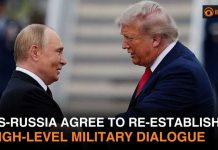
Prime Minister Modi’s bold declaration that India has only “paused” its military actions against Pakistan signals the most serious nuclear standoff since the Cuban Missile Crisis, as both nations remain on high alert after deadly terrorist attacks triggered Operation Sindoor.
Key Takeaways
- India has temporarily paused military operations against Pakistan following Operation Sindoor, but PM Modi warns that action could resume if provoked
- The recent conflict was triggered by a terrorist attack in Pahalgam that killed 26 civilians, prompting Indian strikes on terror camps in Pakistan
- President Trump and his administration claimed credit for brokering the ceasefire, potentially averting what Trump called “a bad nuclear war.”
- Modi rejects Pakistan’s calls for broader talks, stating any future discussions will focus exclusively on terrorism and Pakistan-occupied Kashmir
- India expelled a Pakistani diplomat amid continued diplomatic tensions, even as the military situation stabilizes along the Line of Control
Modi’s Firm Stance on the “Paused” Conflict
In a defiant address to the Indian nation, Prime Minister Narendra Modi made it clear that India’s military actions against Pakistan have merely been “paused” rather than concluded. The statement comes after a series of retaliatory strikes known as Operation Sindoor, launched in response to the heinous terrorist attack in Pahalgam that claimed 26 civilian lives. Modi’s language suggests that India remains prepared to resume hostilities if Pakistan fails to address concerns about cross-border terrorism. The Prime Minister emphasized that India would “retaliate on its own terms” to any future provocations, signaling that the ceasefire remains fragile despite current calm along the Line of Control.
The sudden pause in hostilities came after the most severe military confrontation between the nuclear-armed neighbors in nearly three decades. While President Trump claimed credit for averting a potential nuclear war, Modi pointedly avoided acknowledging any American role in the ceasefire. Instead, he asserted that Pakistan had initiated the ceasefire request following India’s decisive military response. “I think it could have been a bad nuclear war; millions of people could have been killed. So I’m very proud of that,” said Donald Trump, President of the United States, highlighting the gravity of the situation that had developed between the two nations.
Addressing the nation, Modi asserted that India’s armed forces inflicted such “heavy damage” on Pakistan that Islamabad was compelled to plead for global intervention to de-escalate the conflict. If that was indeed the case, why then did Modi agree to an immediate ceasefire,…
— Brahma Chellaney (@Chellaney) May 13, 2025
Operation Sindoor’s Devastating Impact
The Indian military operation, code-named “Sindoor,” targeted terrorist infrastructure deep within Pakistani territory. According to Modi, the precise strikes on camps in Bahawalpur and Muridke resulted in over 100 terrorist casualties and substantially damaged Pakistan’s terror support network. These claims, while disputed by Pakistan, underscore the sophistication of India’s military capabilities, particularly its domestically developed defense systems. The operation marked a significant escalation from previous cross-border actions, demonstrating India’s willingness to conduct deeper strikes against terrorist havens regardless of international pressure.
“if we talk to Pakistan, it will be about terrorism only … it will be about Pakistan-occupied Kashmir,” stated Narendra Modi, Prime Minister of India, making clear the limited scope of any future dialogue with Pakistan.
The Pakistani government reported 11 armed forces personnel and 40 civilian deaths resulting from the Indian strikes. While these figures differ significantly from India’s assessment, they confirm the substantial impact of Operation Sindoor. Both nations have now agreed to reduce troop concentrations along their shared border, and India has reopened 32 airports that had been closed during the height of tensions. Meanwhile, in Indian-administered Kashmir, authorities are working to defuse unexploded ordnance, and evacuated residents have cautiously begun returning to their homes.
Diplomatic Fallout Continues Despite Military Pause
Despite the relative calm on the military front, diplomatic tensions continue to simmer between the two South Asian powers. India recently expelled a Pakistani diplomat, accusing him of “indulging in activities not in keeping with his official status,” a diplomatic euphemism typically used to allege espionage. This expulsion represents the latest in a series of retaliatory measures that have included suspending visa services, halting bilateral trade, and threats to reconsider the terms of the Indus Waters Treaty, a critical water-sharing agreement between the nations.
“Narendra Modi has said India has only “paused” its military action against Pakistan and would “retaliate on its own terms” to any attacks, after a ceasefire brought escalating hostilities between the two countries to a standstill at the weekend,” stated Narendra Modi, Prime Minister of India, highlighting his nation’s readiness to resume conflict if necessary.
Pakistan’s response has been equally harsh, with its Ministry of Foreign Affairs condemning Modi’s statements as “provocative and inflammatory.” The Pakistani government has implemented its own countermeasures, including banning visas for Indian nationals, closing its airspace to Indian aircraft, and imposing trade restrictions. Despite international calls for dialogue, Modi has firmly stated that any future talks with Pakistan would focus exclusively on terrorism and the status of Pakistan-occupied Kashmir, effectively limiting the scope of potential negotiations and ensuring that fundamental tensions will likely persist.
Indian PM Narendra Modi says India has “only paused” its military action against Pakistan, in his first speech to the nation since a ceasefire.
🔗: https://t.co/UT4MaosjSe pic.twitter.com/jVT0EEX4h1
— Al Jazeera English (@AJEnglish) May 12, 2025
Self-Reliance in Defense: Modi’s Strategic Imperative
Throughout the crisis, Modi has emphasized India’s growing military self-sufficiency as a cornerstone of national security. The Prime Minister specifically praised domestically developed defense systems that were deployed during Operation Sindoor, framing India’s technological advancement as essential to combating terrorism. This focus on indigenous military production aligns with Modi’s broader “Make in India” initiative and represents a strategic pivot away from dependence on foreign arms suppliers, including traditional partners like Russia and newer allies such as the United States.
The continued tensions between India and Pakistan serve as a stark reminder of the volatile nature of South Asian geopolitics and the persistent threat of terrorism in the region. While the immediate military crisis appears to have abated, Modi’s characterization of the pause as temporary rather than permanent suggests that India has adopted a more assertive posture that will likely define its approach to Pakistan for years to come. As evacuated civilians return to border areas and diplomatic channels remain strained, the world watches cautiously to see whether this fragile peace will hold or simply represent the calm before another storm.













